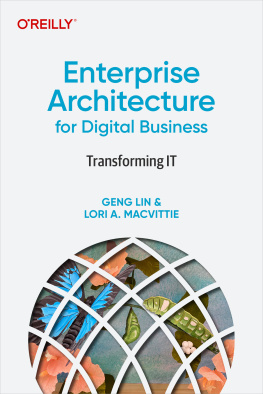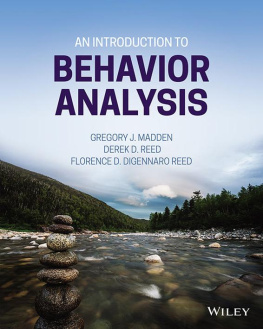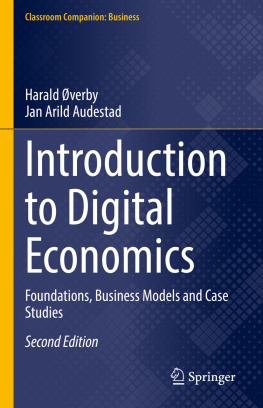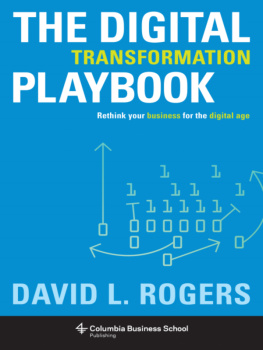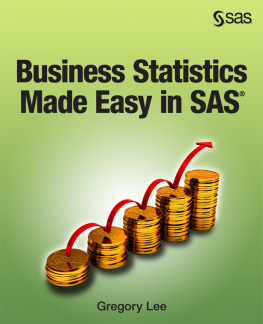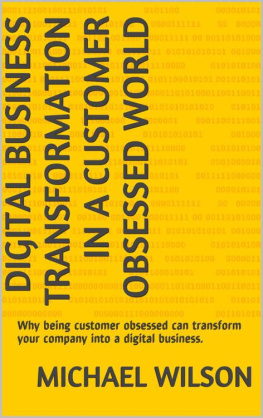Dr. Brian Armstrong
Dr. Gregory John Lee
Introduction to Digital Business

Silk Route Press
Copyright 2021 by Silk Route Press.
This book is copyright under the Berne Convention. All rights reserved.
No part of this publication may be reproduced, stored in a retrieval system, or transmitted, in any form or by any means without the prior written permission of the author.
The author and the publisher have taken all reasonable steps to ensure that this work does not contain any material that is subject of copyright held by another person. Alternatively, they believe that any protected pre-existing material that may be comprised in this work has been used under circumstances that make such use permissible under law.
While the publisher and the author have exercised due diligence to ensure the accuracy of the contents of this work, they take no responsibility for any loss or damage suffered by any person as a result of relying on the information contained herein.
First published in softcover in South Africa in 2021 by Silk Route Press
ISBN 978-0-620-91112-2
Published by Silk Route Press
PO Box 50299
Randjiesfontein 1683
Preface
Welcome to Introduction to Digital Business , a thrilling new text on the fourth industrial revolution and its intersections with business, organizational strategy, and digital transformation and change.
It has become practically axiomatic that technology is a pervasive and accelerating influence on organizations, with wide-reaching impacts on every level of management and business function, from product design and customer experience to HRM and finance.
However, there are so many unknowns and underdeveloped areas of knowledge within the arenas of digitalization and the fourth industrial revolution. What do these things refer to in the first place? What really are the implications for organizational strategy does strategy change fundamentally, or rather adapt traditional thinking and models to new realities? How do organizational effectively and correctly transform themselves to these forces, in order to thrive in our new realities?
Therefore, this book addresses these questions in five parts comprising twelve chapters.
Part I contains a chapter giving an introduction to digitalization and digital business.
Part II then expands on the major fourth industrial revolution (4IR) technologies in three chapters Chapter 2 on foundational 4IR technologies, Chapter 3 on the virtuous triangle on big data, IoT and AI, and Chapter 4 on other 4IR technologies.
Part III is a single large chapter on traditional strategic management theories and models, which does begin to discuss the influences of 4IR.
Part IV is a more directed section that unpacks specific topics on strategy in the digital age: Chapter 6 on disruption and strategy, Chapter 7 on exponentials, abundance, and convergence, Chapter 8 on business models, Chapter 9 on platform businesses, and Chapter 10 on exponential organizations.
Part V covers topics in digital transformation and change management. Chapter 11 discusses digital maturity, and Chapter 12 covers three topics, namely organizational architecture, traditional change management, and agile organization.
Introduction to Digital Business is a smaller companion text to the upcoming Digital Business by the same authors, which provides an expanded Part V on digital transformation and change and contains other material. Together, these texts are essential reading for our time, appropriate and important for managers and business owners, business students, consultants, 4IR experts, and others who are affected by the ongoing technological revolution of our era.
Acknowledgement and Thanks
The authors have many people to thank for this book. We thank our students, without whom we would not have developed our thinking to this stage. Prof Terence van Zyl provided much of the material for the AI section through their lecture development for the Chair. Wed like to thank our copy editors Wynand Steyn, Sayora Khakimova, and Nakuze Chalomba, acknowledging that none of them had responsibility for the whole text and extant editorial errors remain solely the authors responsibility. Finally, we would like to acknowledge our wonderful and patient spouses who sacrificed much to allow us to complete this work.
About the Authors
Professor Brian Armstrong is one of the foremost ICT industry leaders in South Africa, with over 30 years of top-level management experience in Telecommunications, IT, technology R&D and systems engineering, both in South Africa and abroad. He is widely regarded as a thought leader in digitalization, convergence and business strategy.
Brian is currently Professor in the Chair of Digital Business at the Wits Business School. He consults widely to industry and government on technological disruption and digital business and is an acclaimed public speaker on digital transformation and its socio-economic impacts. He is a non-executive director of Old Mutual Limited, the Huge Group and the Tshimologong Innovation Precinct.
Previously Brian spent seven years in the Telkom Group, as Group Chief Operating Officer and Group Chief Commercial Officer, where he was part of the leadership team which has been credited with turning Telkom around. In his time with Telkom he also revived the ailing Telkom Business unit, and conceived and led the acquisition of BCX and its integration into the group. He was also responsible for the groups retail unit, as well as leading group strategy and transformation activities.
Before joining Telkom in 2010 Brian was British Telekoms Vice President for Middle East and Africa with overall responsibility to oversee and grow BTs activities across the region. Before that his work experience includes South Africas CSIR, ultimately as the Director of the Division for Information and Communications Technology; and South African listed ICT services group AST (now Gijima), as Managing Director of AST Networks.
Brian completed his BSc (Eng) and MSc (Eng) at the University of the Witwatersrand in 1982 and 1984 respectively, and obtained his PhD from University College London in 1992.
Professor Gregory John Lee is a member of the Digital Business team at Wits Business School. He is a leading expert in digital transformation, with a specific focus on the transformation of work and workplaces through robotic process automation and analytics. He is a a leading figure in analytics, including big data analytics, for HRM and talent functions. He has written seminal South African books on the topic of a) analytics in HRM ( HR Metrics: Strategic and Quantitative Tools for People Management , Knowledge Resources), b) business analytics and data ( Business Statistics Made Easy in SAS , SAS Institute & two others) c) organizational design, development and people management ( Designing Organizations for People-Led Sustainable Competitiveness , Silk Route Press) and d) digital business (Armstrong, B. and Lee, G.J. 2021. Digital Business . Silk Route Press).
He has published in top journals such as Human Resource Management Journal , the European Journal of Operational Research , International Journal of HRM , Scientometrics , International Journal of Manpower , the Journal of Human Resources Costing & Accounting , and many others.
Greg has a Masters in business and obtained his PhD from University of the Witwatersrand in 2008.
Glossary of Acronyms

 Silk Route Press
Silk Route Press

